Top Risks Associated with DIY AC Repair
Are you having problems with your home’s air conditioning system? Many people in this situation try to save money by attempting DIY air conditioning repair. However, do-it-yourself AC repair isn’t something that professionals recommend. Keep reading to learn more about how why it’s always better to hire licensed HVAC specialists for all air conditioning repair jobs.
Air Conditioning Systems Are Complex
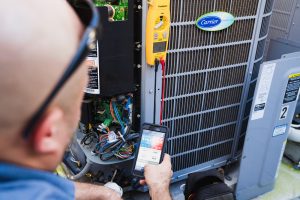
For example, does your air conditioning unit keep tripping the breaker? Because you don’t have the training that an HVAC professional has, you might think all you need to do is change the breaker. So, you look up a tutorial to change the breaker, and the fix doesn’t work. Now, you’ve spent money on a part you didn’t need, wasted time fixing something that wasn’t broken, and you still don’t have air conditioning.
Air Conditioning Repair Requires Special Tools
Depending on the problem, you’ll need more tools that what’s in the average DIYers’ toolboxes. Some of these tools aren’t even available at your local home improvement store, and if they are, you might not know how to use them. Professional HVAC contractors have all the tools, the equipment, and the know-how to make efficient repairs that ensure your air conditioner problems go away.
Access to Parts
Sure, you can find air conditioning filters at your local home improvement store. You might even find an AC capacitor at the hardware store, but that’s about all you’ll find parts-wise at these stores. That’s because air conditioners require specific parts that aren’t available to the general public. Air conditioning repair companies must order these parts from the manufacturer or, in some cases, wholesale distributors. So, although the YouTube video might make it seem easy to install the part, you have to find it first, and that can be the most challenging part of the repair process.
Don’t Give Up Your Valuable Time
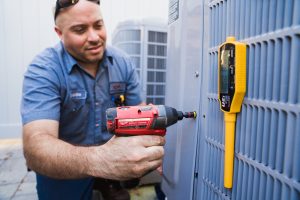
Does professional air conditioning repair cost money? Yes, it does, and sometimes those repairs are costly. However, you’re paying for expertise and peace of mind. You know that the job will get done right the first time and you’ll be cool and comfortable in your home. Peace of mind and time are worth the money you pay for professional air conditioning services.
If your air conditioning isn’t working and you need repair services, Cox Air has the tools, the expertise, and the availability to help you today. Call the local pros at Cox Air in Clearwater, FL, at (727) 442-6158.
The Impact of Humidity on AC Performance
It’s no secret that excessive humidity makes people feel hotter during the summer months. Not only does this affect the outside temperature, but it also affects the efficiency of your air conditioning system. Anytime the humidity gets too high or even too low in the house, this affects how well your HVAC system runs.
Keep reading to learn more about how humidity affects your air conditioning, as well as some tips for keeping humidity levels balanced.
 How Air Conditioners Work
How Air Conditioners Work
To understand the correlation between humidity and your air conditioning system, it’s important to understand how your ac system works. Most people think the only job of the air conditioner is to keep the home cool. However, in order to do this, the system must get rid of moisture from the air. This moisture is what we know as humidity, and the only way to get rid of the heat is to cool the air. Unfortunately, your equipment must have sufficient cooling power to do this, especially when there’s extreme humidity. If your air conditioner can’t do this, you’ll never feel as cool as you could be in your home no matter what the temperature reads on the thermostat.
Signs Your Indoor Humidity Is Too High
How do you know if your home’s humidity levels are too high? You notice one or more of the following signs:
- The air feels clammy and moist and your skin may feel sticky
- Your home’s windows fog
- Your home smells musty, a sure sign there’s excessive dampness in the home
Why Your Air Conditioner Isn’t Keeping Humidity Levels Balanced
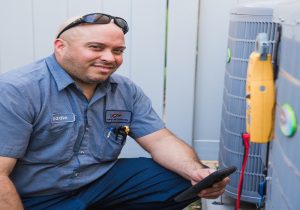
Air conditioners that are too big or more powerful than you need don’t run as often. While you might think this is a good thing, it’s not when you’re trying to remove moisture from the air. The unit turns off before all the moisture is removed and this is what causes your house to feel sticky.
So, how do you fix the problem? Do you need to replace your air conditioner? Luckily, there’s a much cheaper solution.
Install a Dehumidifier
The fastest way to get rid of moisture in the air is to purchase a dehumidifier. This home appliance is an inexpensive way to pull moisture from the air before it enters your home’s duct system and travels through the house. Most people are familiar with portable dehumidifiers that plug into an outlet and use a hose that allows the moisture to drain into a floor drain. There are also models that have a storage area that collects the moisture and needs to be emptied regularly.
If you’re battling high humidity levels, call Cox Air at 727-442-6158 to make an appointment with one of our cooling specialists. We’ll help you explore your options for making your home cool and comfortable once again!
How Your Central Air Works
Air conditioning is a wonder of modern life. It makes it possible to live and thrive anywhere in the world during even the hottest of summers. Nowadays, many families enjoy the benefits of air conditioning via their central air systems. While air conditioning is ubiquitous throughout the country, not many people are actually familiar with how it works. Here’s a brief rundown on how your home’s central air system works.
 The Air Conditioning Process
The Air Conditioning Process
Since their invention, all air conditioners operate in much the same way. The indoor of a home is cooled by the removal of warm air and humidity. The cold air is circulated throughout the house, while the heat and humidity are released outside. Refrigerators have three principal mechanical elements: a compressor, a condenser coil, and an evaporator coil. The manipulation of a refrigerant between these three components is what cools your home.
- The refrigerant gas is pressurized and heated by the compressor, then sent to the condenser coil where it is converted into a liquid.
- The liquid refrigerant is sent to the indoor evaporator coil where it evaporates and cools the coil.
- Indoor air is blown across the coil, allowing the refrigerant to absorb the home’s indoor heat.
- While the cooled air is circulated throughout the home, the heated refrigerant gas is returned to the compressor coil where the process begins again.
- The heated indoor air and humidity are released outside.
Elements of the AC System
For everything to work according to plan, every part of the AC system needs to be working properly. In the outdoor unit, you’ll find the compressor, the condenser coil, the fan, and all the relevant electrical components. On the inside of the home is where the evaporator coil is usually located. In order for air and refrigerant to move freely between the inside and outside units, they are connected by a series of pipes and refrigeration lines. The refrigerant itself is required to absorb the heat in the home which cools off the environment. Some ducts act as air tunnels that occupy various parts of the inside of your house that are required to circulate the air. Then, there is a thermostat that controls the whole system.
 Maintaining Your AC
Maintaining Your AC
There are things you can do to make sure your home’s air conditioning is working the way it should. Replace your air filters every three months throughout the year and monthly during the peak of summer. Also, install a programmable thermostat. By automatically raising your home’s temperature at night and while you’re at work—and lowering it when you’re at home—a programmable thermostat can help you cut back on monthly energy bills while reducing strain on your AC.
Taking small steps like these is enough to ensure that your home’s air conditioner will give you the cool air you need at the times you need it most. For emergency repair or regular maintenance, contact the experts at Cox Air at (727) 442-6158. Give us a call today!
Tips to Negate Foul Air-Conditioning Smells
Many have experienced this in the past: you turn on your air conditioner to make your home more comfortable, but when it kicks in, you notice a bad smell emanating from the vents. Air conditioner odors can occur for several reasons. Knowing the cause of the scent is essential to fixing the issue and making it go away. Keep reading to learn more about why the smells appear and how to get rid of them.
 Why Does My Air Conditioner Stink?
Why Does My Air Conditioner Stink?
Rotten smells coming from the AC can be the result of many different things. One of the most common AC issues people experience is referred to as “Dirty Sock Syndrome.” This occurs when bacteria and mold build up on the evaporator coil and create a moldy odor that is similar to dirty socks. Another common AC smell is heating or burning wires. This is a distinct odor that is caused by a loose cable or short-circuited board. Do you smell the scent of rotten eggs coming from your vents? If so, it may be caused by a dead animal in the air duct. This is a serious situation that will require professional help to fix.
How to Remove AC Odors
The causes listed above are just a few of the many things that can cause a bad air conditioner smell. To get rid of the smell, use the tips below.
- Clean the AC: Though some parts of the AC must be professionally cleaned, you can clean the air filters, outdoor unit, and ducts on your own. All you need is a rag, brush, and a vacuum cleaner with a long hose attachment. Cleaning will help to remove and prevent any bacterial buildup.
- Install Duct Filters: These help to control odor and keep your ducts cleaner. You can easily find them at your local home improvement store.
- Perform Seasonal Maintenance: Getting your system inspected regularly helps it to stay clean and operate efficiently. The technician will also keep their eye out for any issues that could create a foul odor in the future and repair them before they progress any further.
- Use Artificial Odor Control Methods: Sometimes, the odor may not be coming from the HVAC system, but rather the air outside. In this case, you may need to rely on other odor control methods, such as candles, aerosol sprays, and incense. You can also use an air purifier or put baking soda inside the ducts.
 When to Seek Professional Help
When to Seek Professional Help
Some air conditioner issues require professional help fix. If you have done everything you can and the smell still continues, it is time to call an HVAC professional. They can inspect every inch of your HVAC system and discover the root cause of the odor. A technician can also clean every nook and cranny of the system. This is essential if your unit is severely clogged with dust and debris, or if you notice mold growth inside the air conditioner. You also need to call a professional if you suspect there is a dead animal inside one of the air ducts. Because this can cause health issues, it requires cleaning and disinfecting by a professional.
[IMAGE 2]
If you’ve noticed foul odors coming from your air conditioner, call on an expert from Cox Air to see how we can get your home smelling fresh again.
Why Indoor Air Quality Is More Toxic Than the Outdoors
Air pollution isn’t often associated with indoor air. Vehicle exhaust, combustion of fossil fuels, dust and dirt from agriculture and construction — these are some of the causes of outdoor air pollution that we’re so used to hearing about. While outdoor air pollution is harmful, however, the EPA says indoor air pollution levels are often 2-5 times higher than outdoor level. This is a conservative number because in some instances, indoor air pollutant levels can exceed levels of the same outdoor air pollutants at a level 100 times higher. This means the air inside your home or workplace can be more toxic to you than the air outdoors. Continue reading and learn how this happens.
 Radon Gas
Radon Gas
Radon occurs naturally outdoors and is produced when uranium breaks down in soil and rocks. Radon levels outdoors are harmless. Inside your home, radon gas can expose your lungs to small amounts of radiation. Breathing in radon gas for many years can damage cells in the lung’s lining and increase a person’s risk of developing lung cancer. While the risk of lung cancer from radon isn’t as high as the risk for cancer associated with smoking, combining the two does create a greater cancer risk. Radon gas gets into a building through cracks in the foundation. Levels are usually highest in the basement or crawl space.
Cleaning Supplies
Most people use a variety of cleaning products to ensure they have a clean smelling home. It’s the chemicals in the cleaning products that make your home smell fresh. Those chemicals can irritate your lungs. If you’re an elderly person, suffer from chronic illness, or have asthma, cleaning products may contribute to poor health. You may notice an increase in headaches, respiratory problems, and even skin rashes. The best way to have a clean smell in your home is to open the windows and let things air out naturally.
Volatile Organic Compounds

Cigarette Smoke
Another common indoor air pollutant comes from cigarette smoke. Called environmental tobacco smoke, this includes smoke exhaled by the smoker, and what comes from the actual smoking product. The cigarette, cigar, or pipe emits side smoke. Both pollute indoor air. When you consider that indoor air doesn’t get filtered as quickly as air outside, it’s not hard to see how cigarette smoke can create a more toxic environment inside a home or building. Environmental tobacco smoke contains high levels of particulate matter (PM). PM is also called particle pollution and is a mixture of solid particles and liquid droplets. High PM levels indoors may result in health issues. Households where people smoke have a higher PM level than those that are smoke-free.
You can reduce indoor air pollution by paying attention to the cleaning supplies you use, being aware of products with VOCs, and not smoking indoors. Even so, one of the biggest sources of indoor air pollution is cooking. If your stove doesn’t have a good ventilation system, instead of pushing cooking fumes outside, they remain indoors where you breath them in.
Contact Cox Air today if you’d like more information about how you can maintain healthy indoor air quality.
5 Common Issues with Older AC Systems
With so much else going on in your life, the last thing you want to worry about is your air conditioner breaking down. Unfortunately, when you have an older air conditioner, the chances that it will fail grow higher and higher with each passing year. Dealing with a broken air conditioner can be a costly and time-consuming issue, especially during the summer when you need it the most. To prevent a breakdown this year, read on about a few of the most common issues 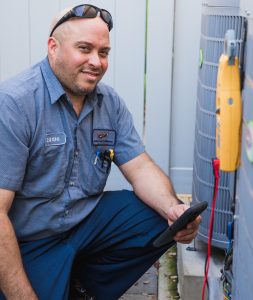
Electrical Difficulties
Air conditioners are made up of a complicated system of various electrical pieces. Wires wind through the unit, connecting the circuit boards to the compressor, coils, fans, and other parts. If you have an older AC, there is a higher chance that something could go wrong with the electrical system. A wire could fray or the capacitor could break. With so many different electrical pieces, it’s likely that something could go wrong.
Nonfunctional Fans
The fan in your air conditioner is responsible for making the hot air flow out of your home and the cold air flow in. Without a working fan, your AC won’t function. If the fan moves too slowly or does not move at all, the unit will be unable to cool down your home. Fan problems can be caused by anything from something simple like excess debris in the unit to something more complex like an electrical issue. Either way, you should hire a professional HVAC contractor to investigate the matter further.
Decreased Efficiency
As your AC gets older, it will become less efficient. If you’ve noticed your energy bills getting higher over the past few years or that you need to run the AC for longer than usual, this could be your problem. When an air conditioner gets less efficient, it uses more energy to keep your home at a comfortable temperature. With regular maintenance, you can likely solve this issue. However, in some cases, it may require you to get the whole unit replaced.
 Leaky Refrigerant
Leaky Refrigerant
Older air conditioners also tend to leak more than newer models. If your energy bills have increased, the coils are frozen, or your AC isn’t cooling your home as well as before, you may have a leak. This is typically caused by a crack in the coils that circulate refrigerant through the unit. If you believe that refrigerant is leaking from your unit, contact an AC specialist as soon as possible.
Regular Wear and Tear
Like every other appliance, your air conditioner will begin to show common signs of wear and tear as it gets older. The more you use your unit, the faster it will deteriorate. Eventually, your unit will break down and need to be replaced. However, you can extend its usable life by performing regular maintenance. Clean the outdoor unit, change the air filter, and hire an HVAC professional to perform an annual exam every spring. With regular tune-ups, you can catch small issues before they become larger ones and keep your AC in working condition for a long time to come.
Top Tips for Preparing Your Home for AC Installation
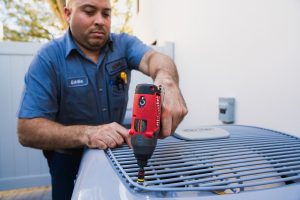
Double-Check the Numbers
While running the numbers and doing your research obviously happened while you hunted for the right AC unit, take the time to double-check everything one last time before the AC unit actually makes it to your house. Check the cooling load, taking into account the size, location, direction, structure, insulation, and other details of your home. Make sure the unit has the right capacity to meet your home’s cooling needs efficiently. Ask any questions you still have and get your answers from your AC experts before your installation date.
Ready the Ducts
An excellent step you can take to prepare your home for AC installation is to have your ducts readied and cleaned. You don’t want any dirt, grime, or other buildup that’s been working its way into your system for what may be decades to muck up your brand-new AC unit. Having your ducts cleaned and properly sealed by a professional will help to ensure the cleanliness and integrity of your entire cooling system and will improve the overall quality of the air you breathe within your home. Schedule an inspection and cleaning before your installation date to ensure that everything is in good shape when your new AC unit arrives.
Declutter the Work Area
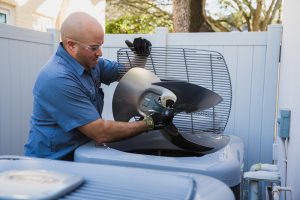
For questions about AC installation or to schedule your install, call the experts at Cox Air today at 727-442-6158!
How Often Do You Need to Get Your AC Serviced?
We rely on our air conditioner much more than we think. Living in a cool home environment is the norm these days, and you may not think to do regular maintenance on it. But, air conditioners are sophisticated machines that require regular maintenance to provide optimum performance. When we neglect to give it the service it needs, an AC unit won’t work efficiently, and may even be prone to failing altogether. We explain why ACs need regular tuning and how often you should do it.
 Preventing Breakdowns
Preventing Breakdowns
It’s one of the worst feelings in the world. You’re deep in the middle of a heatwave when the air conditioner goes out. No matter how quickly you can get it resolved, you’re still looking at a lot of time sweating it out. The good news is this can be easily avoided by having a professional service your HVAC regularly. During maintenance, a technician can catch problems like refrigerant leaks, broken censors, rusted coils, and thermostat issues before a breakdown takes place. Additionally, you’ll notice your AC will work better with regular service, making for a cooler, more comfortable home environment.
A Longer Life for Your AC
An air conditioner isn’t merely a functional part of protecting your home; it’s an investment. As with any investment, you want to get the most out of it as you possibly can. Scheduling annual service is probably the most important thing you can do to make sure your AC will function properly for years to come. A regularly maintained AC unit should last between 10 and 15 years. That number drops precipitously to 5 to 10 years without regular maintenance.
Lower Energy Bills
As you undoubtedly know, your energy consumption can increase during the summer. However, you can dramatically reduce it by merely having your AC unit serviced on an annual basis. A technician can clean and replace parts such as coils, filters, and evaporators that can become dirty and clogged over time. Debris clogging your system results in higher energy amounts that can be avoided with regular service.
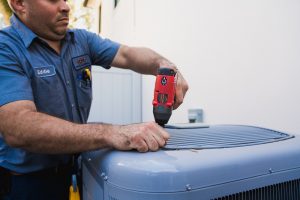
When you schedule an appointment once per year with an HVAC technician, you will save money on costly repairs and wasted energy, while making your home a better place to live. It’s one of the simplest and most effective things you can do to improve your family’s quality of life. To schedule your next service, call Cox Heating & Air Conditioning at (727) 442-6158. We’re the leading HVAC contractor in Clearwater, FL, and we’ll make every effort to make sure you stay cool all year. So, beat the heat and give us a call today!
Signs You Need to Get Your AC Serviced
With proper maintenance, your air conditioner should keep you cool and work well for many years. However, that doesn’t mean there won’t be times when you need air conditioning service. If your air conditioner stops running completely, it’s not hard to know you need repair services. Ideally, you don’t want to find yourself in this position because it means you’ll be sweating it out in your home waiting for a repair tech to show up.
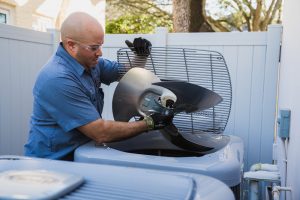
The Air Isn’t Cool
Have you noticed warm air coming from the vents when the air conditioner is running? This happens when either the filter is dirty or the Freon levels are low. Start by checking the air filter. Is it dirty? If so, change the filter and see if that makes a difference. After changing the filter, if the air is still warm, call a technician to come out and check the coolant levels. It’s not unusual for the Freon to need recharging once in a while.
Weak Air Flow
If your home isn’t cooling well, check for air flow issues. Place your hand over the vent while the air conditioner is running. Does the air flow feel strong or weak? Weak air flow happens when the compressor unit goes bad, but it can also be an indication that there’s an issue with your ductwork. You won’t know for sure until you have the unit serviced. Don’t wait to do this because you’ll continue to experience poor performance and energy loss.
Leaky Air Conditioners
Moisture problems are common with air conditioners, especially as they get older. Sometimes the drain line to the unit becomes damaged or blocked. In a case like this, you need to unclog the drain line or have it replaced. It’s a simple repair that doesn’t take long or cost a lot.
The second reason for leaky air conditioners is a Freon issue. If the unit is leaking refrigerant, you need to have the unit serviced right away. Refrigerant is a hazardous chemical that can cause serious health problems if ingested by people or pets.
 Strange Sounds
Strange Sounds
Your air conditioner will make sounds while in operation, but these sounds shouldn’t be noticeable. In fact, they should fade into the background. Noticeable and unusual sounds are the ones you need to be concerned with and include squealing, banging, or thumping. Squealing noises usually indicate an issue with a belt, whereas grinding sounds signal there’s something wrong with a bearing. Don’t wait to have these unusual noises checked out. Waiting too long could lead to a pricey repair or an unexpected need for a unit replacement.
Knowing the signs of a failing air conditioner is important because it gives you time to call for service and, hopefully, avoid expensive repairs. If you’re concerned about your home’s air conditioner, contact Cox Air, the HVAC pros in Clearwater, FL, at 727-442-6158.
Common Causes Behind AC Failures
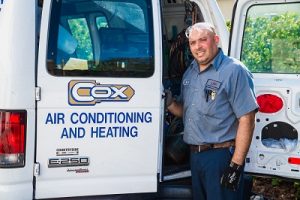
Tripped Fuses and Faulty Breakers
If your air conditioner stops working suddenly, don’t panic. Check your circuit breaker to see if the fuse was tripped. Sometimes this happens if there is a power surge. If the circuit has been tripped off, turn it back on. Did the air conditioner start up again? If not, call a technician to come take a look.
Frozen Coil Problems
When there are air flow problems, the coil in the unit tends to freeze. This problem is easy to identify because frost will be visible on the coil or around it. The easiest way to avoid this problem is to make sure your air filters get replaced regularly and that the ductwork is clean.
Refrigerant Issues
Have you had trouble getting cool air to flow from your vents? This is likely a refrigerant issue. There’s probably a leak in the system that may or may not be visible. Or, the refrigerant is low and needs refilling. Both of these situations require a professional HVAC technician.
Worn Parts
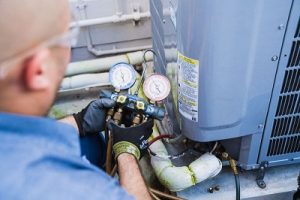
Faulty Thermostats
This is one of the easiest and most inexpensive air conditioning repairs. Unfortunately, it’s often overlooked by people who think the worst when their air conditioner isn’t working right. However, if your thermostat is broken or not wired correctly, it can’t maintain the temperature in your home. Depending on the signs you describe to your technician, the thermostat may or may not be the first thing they check.
Don’t Neglect Annual Maintenance
Many serious HVAC problems are avoidable with regular maintenance. Some of these maintenance tasks you can do yourself, such as replacing the air filters regularly and cleaning the outdoor condenser unit. Other maintenance services, such as checking for loose parts, refilling the refrigerant, and replacing broken components, need to be done by professionals. If you suspect there’s a problem with your air conditioner, don’t wait to get a service professional out to your home to take a look.
If you’re having problems with your home’s air conditioner and need professional HVAC service, call Cox Air at 727-442-6158 today!





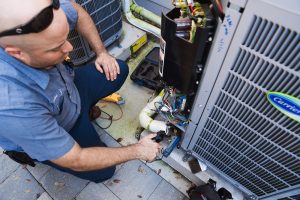

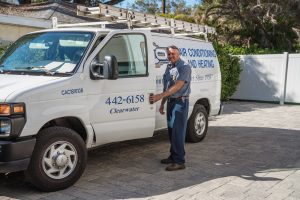
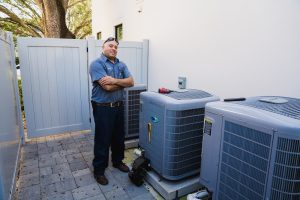

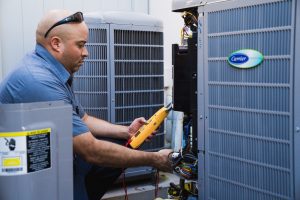
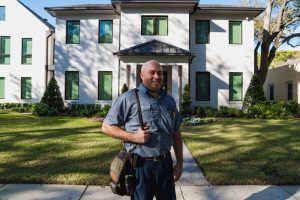



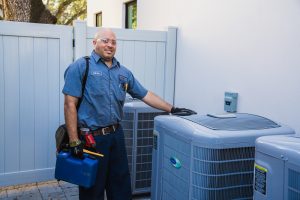


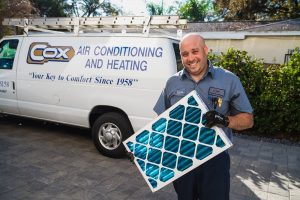

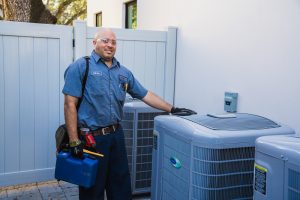


Recent Comments